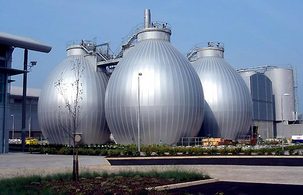
Advantages
- Low biological solids yield which means less wasting than seen in aerobic treatment
- Tolerant of heavy loadings, actually heavy loadings of 5 - 10 kg COD/m3 of reactor volume is almost a necessity compared to 1 kg COD/m3 for aerobic system loading
- With the low cell yield it is often not necessary to add nitrogen or phosphorus macronutrients
- Methane can yield energy for use
- Methanogenic archea are slow growing microbes
- Can produce odors if influent is high in sulfur and/or methanogens are not healthy resulting in exhaust containing volatile organic acids
- pH must be controlled along with monitoring of volatile fatty acids
- Does not do well with dilute wastes and some materials that are better treated via aerobic pathways (insoluble fats, oils, grease)
- Does not remove ammonia-nitrogen
- Temperature must be maintained year round in target zone - for most mesophilic digesters it is 35 - 40oC.
- Methane producing microbes require some micronutrients that may be lacking this includes Fe, Co, Ni, Mo. For a journal article on micronutrients and bacillus fermentation product improving methane production study - http://www.ncbi.nlm.nih.gov/pubmed/16180439

 RSS Feed
RSS Feed